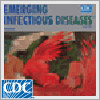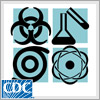Podcasts

Type 2 Diabetes Mellitus and Increased Risk for Malaria Infection
This podcast describes research done in Ghana examining a correlation between type 2 diabetes and a possible increased risk for malaria infection in adults. Dr. Manoj Menon, a medical officer in the Division of Parasitic Diseases and Malaria in the Center for Global Health, discusses questions the study raises.Created: 9/23/2010 by National Center for Emerging and Zoonotic Infectious Diseases; Center for Global Health. Date Released: 9/23/2010.

Recognizing and Treating Malaria in U.S. Residents
This podcast is an overview of the Clinician Outreach and Communication Activity (COCA) Call: It's a Small World After All: Dengue and Malaria in U.S. Residents - Recognizing and Treating These Mosquito-borne Diseases. CDC's David Townes discusses clinical presentation, transmission, prevention strategies, new treatments, and malaria resources available to health care providers. Created: 6/9/2010 by Division of Parasitic Diseases and Malaria, Center for Global Health and Emergency Communication System (ECS)/Joint Information Center (JIC); Office of Public Health Preparedness and Response (OPHPR). Date Released: 6/15/2010.

Many Healthy Returns
International travel is usually very safe but there are things you should do to stay safe and healthy. Experts show you how to avoid problems when visiting developing nations. This includes being cautious about the food you eat and the water you drink, and to be aware of vehicles and road conditions to prevent problems. Created: 2/8/2010 by National Center for Emerging and Zoonotic Infectious Disease (NCEZID). Date Released: 2/8/2010.
![]()
![]() Listen To / Watch This Podcast (4:21)
Listen To / Watch This Podcast (4:21)

Passport To Health
Each year more Americans travel overseas. Health experts suggest that you take several key steps to be proactive, prepared, and protected against injury or illness while outside of the United States, especially in developing nations. Created: 2/8/2010 by National Center for Emerging and Zoonotic Infectious Disease (NCEZID). Date Released: 2/8/2010.
![]()
![]() Listen To / Watch This Podcast (4:37)
Listen To / Watch This Podcast (4:37)

Reflections on Public Health: Captain Hart and Malaria
This podcast consists of segments of an interview conducted by Capt. Kathleen McDuffie, CDC, with Capt. Russell Hart, a 100 year old retired sanitary engineer of the U.S. Public Health Service Commissioned Corps as he reflects on his work in malaria control. The interview was conducted in 2006. Created: 10/1/2006 by Coordinating Center for Health Information and Service (CCHIS), National Center for Health Marketing (NCHM). Date Released: 1/7/2009.
![]()
![]() Listen To / Watch This Podcast (7:34)
Listen To / Watch This Podcast (7:34)

Malaria and Tropical Travel
Malaria is a serious mosquito-borne disease that can lead to death. This podcast discusses malaria risk when traveling to tropical areas, as well as how to protect yourself and your family from malaria infection. Created: 5/15/2008 by National Center for Zoonotic, Vector-Borne, and Enteric Diseases (NCZVED). Date Released: 5/29/2008.

Malaria Matters
This podcast gives an overview of malaria, including prevention and treatment, and what CDC is doing to help control and prevent malaria globally. Created: 4/18/2008 by National Center for Zoonotic, Vector-Borne, and Enteric Diseases (NCZVED). Date Released: 4/18/2008.

Malaria: Prevention is the Best Defense (A Cup of Health with CDC)
The majority of malaria infections in the United States occur among persons who have traveled to areas with ongoing malaria transmission. This report summarizes cases in persons with onset of illness in 2005 and summarizes trends during previous years. Created: 6/8/2007 by MMWR. Date Released: 7/20/2007.

Malaria: Prevention is the Best Defense (A Minute of Health with CDC)
The majority of malaria infections in the United States occur among persons who have traveled to areas with ongoing malaria transmission. This report summarizes cases in persons with onset of illness in 2005 and summarizes trends during previous years. Created: 6/8/2007 by MMWR. Date Released: 7/20/2007.

Insecticide Resistance Reducing Effectiveness of Malaria Control
Malaria prevention is increasingly insecticide based. Dr. John Gimnig, an entomologist with the Division of Parasitic Diseases, CDC, discusses evidence that mosquito resistance to insecticides, which is measured in the laboratory, could compromise malaria prevention in the field. Created: 1/24/2007 by Emerging Infectious Diseases. Date Released: 3/13/2007.
Additional Podcasts
- Page last reviewed: November 9, 2012 (archived document)
- Content source:


 ShareCompartir
ShareCompartir